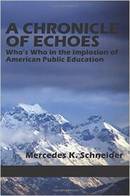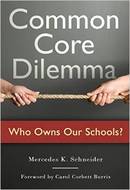On April 06, 2016, in its "Charters and Choice" section, EdWeek published an article entitled, "Charter School Graduates More Likely to Stay in College, Earn Higher Salaries." The article concerns this study of Florida charter schools as published on April 04, 2016, in the Journal of Policy Analysis and Management (JPAM).
The EdWeek article notes that the JPAM study was funded by the Joyce Foundation (which is in Chicago; President Obama was once on the Joyce Foundation board). However, EdWeek does not mention that the Gates Foundation also funded the study.
In short, after offering quite a list of limitations, including the fact that no state colleges in Florida were part of the study -- only private colleges and universities in Florida as well as colleges and universities in other states -- the JPAM study finds in favor of charter high school grads. The EdWeek article fails to mention this critical limitation.
Also, the study only involves comparison of two limited groups of students: those who attended Florida charter schools in the eighth grade and through high school versus those who attended charter schools in eighth grade and left to attend traditional public high schools.
Thus, the JPAM study omits all students who only attended traditional public schools. The EdWeek article does not clearly outline this key limitation in its opening statement- and it should have:
Charter school graduates in Florida were more likely stay in college and earn higher salaries than their district school peers.
That opener only confuses and misrepresents.
As for the finding that charter high school students are more likely to stay in college: The Florida high school graduates who attended charter schools from eighth grade through high school and who attended a private Florida college/university or an out-of-state college/university (remember, in-state postsecondary institutions were not tracked in this study) for two consecutive years (there's your "stay in college" -- two years in a row) is 9 percent higher for this specific group than for the "matched on key characteristics" control group of students who attended charters in eighth grade and then attended traditional public high schools.
Also, the very specific, charter high school attendee sample was 6 percent more likely to graduate from high school within five years.
Though the findings are statistically significant, practical significance (i.e., the difference this makes in the real world) is scant.
As for the charter sample's higher earnings: This, too, is a statistically significant finding that is of questionable practical significance: An increase in maximum earnings of $2,318 between ages 23 and 25 years old, or 12 percent more than their traditional-public-high-school control group.
The EdWeek article mentions the 12 percent increase, but it does not include the actual dollar value of $2,318 per year for 23- to 25-year-olds. The actual dollar amount removes some of the shine from that percentage.
Consider this: Average maximum earnings for the traditional-public-high-school control group was $19,366 per year- not much to live on. So, this limited study found that students who attended Florida charters from eighth grade through high school and who attended in-state private colleges/universities or out-of-state colleges/universities (but state-funded colleges/universities in Florida) were earning an average of $21,684 per year between the ages of 23 and 25- also not much to live on.
Truth is, both $19k and $22k annually in 2016 would likely land these young people back in their parents' basements if their only other option were to pay for housing without the assistance of one or more roommates.
So, yes, there might be statistical significance in this study, but it is overshadowed by both practical significance and the limits on the study sample as noted in this post.
***
Originally posted 04-10-16 at deutsch29.wordpress.com
Schneider is a southern Louisiana native, career teacher, trained researcher, and author of the ed reform whistle blower, A Chronicle of Echoes: Who's Who In the Implosion of American Public Education.
She also has a second book, Common Core Dilemma: Who Owns Our Schools?.


